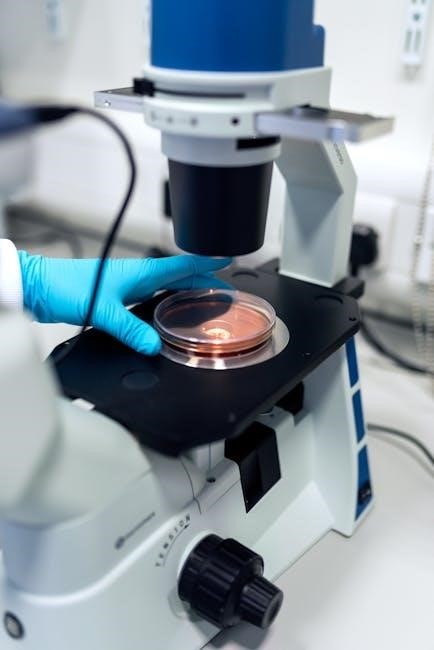fairview lab guide

Welcome to the Fairview Lab Guide, a comprehensive resource designed to help patients and healthcare providers navigate laboratory testing with ease. This guide provides essential information to ensure accurate test results and informed decision-making. Whether you’re preparing for a test, understanding your results, or learning about lab procedures, this guide offers clear, concise, and reliable information to support your healthcare journey.
1.1; Purpose of the Guide
The Fairview Lab Guide is specifically designed to serve as a trusted resource for patients, healthcare providers, and laboratory professionals. Its primary purpose is to bridge the gap between complex medical information and everyday understanding, ensuring that everyone involved in the process of laboratory testing is well-informed and empowered. By providing clear, accurate, and up-to-date information, the guide aims to improve healthcare outcomes by facilitating better communication and decision-making;
The guide is intended to address the needs of individuals who may feel overwhelmed by the intricacies of laboratory testing. It serves as a comprehensive reference, covering essential topics such as test preparations, procedures, and result interpretations. Whether you are a patient preparing for a lab test or a healthcare provider seeking to educate your patients, this guide is designed to be your go-to source for reliable information.
Moreover, the Fairview Lab Guide strives to enhance the overall quality of care by ensuring that laboratory tests are performed accurately and efficiently. By educating users about the importance of proper test preparation, potential factors that could affect results, and the significance of timely follow-up, the guide plays a vital role in improving patient care and satisfaction.
Ultimately, the purpose of the Fairview Lab Guide is to empower individuals with the knowledge they need to navigate the world of laboratory testing confidently. By doing so, it aims to foster a more informed and engaged healthcare community, where patients and providers work together to achieve the best possible outcomes.
1.2. Scope of the Guide
The Fairview Lab Guide is an extensive and organized resource that covers a wide range of topics related to laboratory testing. Its scope is designed to be comprehensive, addressing the needs of both patients and healthcare professionals. The guide includes detailed information about various laboratory tests, their purposes, and how they are conducted. It also provides insights into how to prepare for tests, what to expect during the process, and how to interpret results.
The guide is structured to ensure clarity and accessibility, making it easy for users to find the information they need. It covers common laboratory procedures, such as blood tests, urinalyses, and imaging studies, as well as more specialized tests. Additionally, it addresses factors that can influence test results, such as diet, medications, and lifestyle habits, helping users understand how to ensure accurate outcomes.

The scope of the Fairview Lab Guide also extends to the practical aspects of laboratory testing, including scheduling appointments, understanding test costs, and accessing results. It serves as a valuable tool for patients who want to take an active role in their healthcare by understanding the tests their providers recommend. For healthcare professionals, the guide offers a reliable reference to educate patients and streamline communication.
By focusing on both the technical and practical aspects of laboratory testing, the Fairview Lab Guide ensures that its content is relevant and useful to a broad audience. It avoids overly technical language, making it accessible to those without a medical background, while still providing enough detail to be valuable for professionals. This balanced approach ensures that the guide meets the diverse needs of its users.

Understanding Lab Tests
Understanding lab tests is crucial for effective healthcare management. Laboratory tests are medical procedures that analyze samples like blood, urine, or tissue to diagnose diseases, monitor health conditions, and prevent illnesses. They provide valuable insights into the body’s functions, helping healthcare providers make accurate diagnoses and develop personalized treatment plans. This section explores the fundamentals of lab tests, their purposes, and how they contribute to overall patient care.
2.1. Importance of Laboratory Testing
Laboratory testing plays a vital role in modern healthcare, serving as a cornerstone for accurate diagnosis, treatment, and disease prevention. Lab tests provide essential information about a patient’s health status, enabling healthcare providers to identify potential issues early, monitor chronic conditions, and tailor treatment plans to individual needs. By analyzing biological samples, such as blood, urine, or tissue, labs uncover critical data that guide clinical decision-making.

One of the most significant benefits of laboratory testing is its ability to detect diseases in their earliest stages, often before symptoms appear. Early detection improves outcomes by allowing timely interventions, reducing the risk of complications, and enhancing the effectiveness of treatments. For example, routine blood tests can reveal high cholesterol or abnormal blood sugar levels, enabling patients to make lifestyle changes or seek medical intervention before conditions like heart disease or diabetes progress.
Laboratory testing also ensures the accuracy of diagnoses. Many symptoms overlap between different conditions, making it challenging for clinicians to pinpoint the exact cause without objective data. Lab results provide a clear and reliable foundation for diagnosing illnesses, reducing the likelihood of misdiagnosis and unnecessary treatments. This precision is particularly crucial in managing complex or rare conditions, where timely and accurate diagnosis is essential for effective care.
Additionally, lab tests are indispensable for monitoring chronic diseases and assessing treatment response. For instance, patients with diabetes rely on regular blood glucose monitoring to adjust their medication and lifestyle habits. Similarly, individuals undergoing cancer treatment may require frequent lab tests to evaluate the effectiveness of therapy and make adjustments as needed. This ongoing monitoring ensures that care remains optimized and patient outcomes are improved.
2.2. How to Prepare for Lab Tests
Proper preparation is essential to ensure accurate and reliable lab test results. Different tests may require specific preparation steps, so it’s important to follow the instructions provided by your healthcare provider or the lab. Here are some general guidelines to help you prepare for most lab tests:
- Fasting: Many tests, such as blood glucose or lipid panels, require fasting for 8–12 hours before the test. During this time, only water is allowed.
- Hydration: For tests that don’t require fasting, drink plenty of water to ensure proper blood flow and accurate results.
- Medications: Inform your healthcare provider about any medications, supplements, or vitamins you’re taking, as some may interfere with test results. Your provider may ask you to temporarily stop certain medications.
- Check for Specific Instructions: Some tests, such as urine or stool tests, may require special collection procedures. Make sure to follow these instructions carefully.
- Arrival Time: Plan to arrive 10–15 minutes before your scheduled appointment to complete any paperwork or preparation steps.
- Avoid Alcohol and Tobacco: These substances can interfere with certain lab tests, so it’s best to avoid them for at least 24 hours before testing.
- Dress Appropriately: Wear loose, comfortable clothing that allows easy access to the area where the test will be performed (e.g., blood draws or other procedures).
- Ask Questions: If you’re unsure about any preparation steps, contact your healthcare provider or the lab for clarification.
By following these preparation steps, you can help ensure that your lab tests are performed safely and accurately, providing your healthcare provider with the information needed to make informed decisions about your care.
